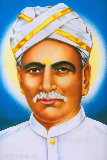
Ayyankali is considered to be one amongst the first tide of social reformers from the erstwhile state of Travancore in British India, who paved the way for many radical changes towards elevating the social wellbeing of lower caste communities in the region and improving access to education.
Born on 28 August 1863 in Perumkattuvila, Thiruvananthapuram, he grew up in a time where uprisings against the upper castes were seldom heard of and a Dalit was slain for even having the audacity of glancing at an upper caste individual.
Compared to his fellow brethren of the Pulayar community, Ayyankali was born into a slightly privileged family, which had been bestowed with five acres of land by a kind landlord. But privilege didn’t let the man close his eyes to the atrocities that were mercilessly being plied upon the lower castes.
You may also like: Meet Yedu Krishnan, One of the First Dalit Priests to Perform Rituals in Kerala Temple
Being illiterate like rest of the Dalit community, Ayyankali realised that only education had the power to shake the foundations of the bigoted system and lead way for a better world, where all were considered equal without any underlying prejudices.
However, the extent of discrimination imposed upon the people, which included being derided as ‘unseeables’ and ‘unapproachables’ apart from being tagged untouchables, infuriated Ayyankali as much as to set him on a revolutionary path of defying every known norm of an inhumane social structure.
He was also enraged by the open sexual abuse that Dalit women were subjected to.
From seeking sexual favours from married women to penalising them for wearing clothes in public, the families remained quiet on the harassment by upper strata, for fear of being punished or even killed.
Gathering a group of like-minded people, Ayyankali unleashed his first wave of rebellion through folk dance and music laced with dissent at the end of their workday. Voicing out sentiments of the downtrodden, the man soon began to be known as Urpillai and Moothapullai.
Another rebellious step taken by Ayyankali was to ride a bullock cart that he had bought out of his own money, on the public road reserved for the upper castes. Both the act of purchase and that of travelling on a road were traditionally the strongholds of the upper castes.
Also, not only were Dalits not allowed to walk on these roads, they were forced to maintain a distance of at least 64 steps from the Nair community and 128 steps from Namboodiris. And with a single act of defiance, Ayyankali succeeded in destabilising the traditional order.
He also showcased his opposition to the system in interesting ways. From dressing like an upper caste Nair to the market in Nedumangad to establishing a school for Dalit children in Venganoor, the man found great popularity amidst the lower castes. But ended up earning the ire of the upper caste communities and the school was soon burned down.








